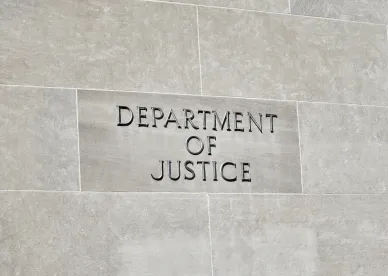On August 14, 2020, for the first time in roughly six years, the US Department of Justice (DOJ) issued an advisory opinion regarding compliance with the Foreign Corrupt Practices Act (FCPA). More than two years ago, former Assistant Attorney General Matthew Miner urged companies to seek opinions from DOJ while undertaking mergers and acquisitions (M&A) activity to determine whether a particular transaction or component of a transaction would trigger an FCPA investigation by the Department. Yet, before last week, DOJ had not issued any opinions following former AAG Miner’s comments. In fact, since 1980, DOJ has issued only 62 opinions related to the FCPA. This is likely because DOJ will only issue opinions in limited circumstances. Even in those limited instances, it is often impractical to seek an opinion because it usually takes months, if not years, for DOJ to issue one. Nonetheless, it is important for companies to promptly identify and address risks identified in diligence to satisfy DOJ and Securities and Exchange Commission (SEC) expectations. And, as DOJ’s recent opinion demonstrates, companies can at least consider whether it makes sense (or is even possible) to seek an advisory opinion as well.
IN DEPTH
Background
Following the enactment of the FCPA, Congress directed DOJ to provide advisory opinions through Opinion Procedure Releases. The regulations governing these releases, 28 CFR § 80, allow companies that are either issuers or “domestic concerns” under the FCPA to obtain an opinion from the attorney general about whether “certain specified, prospective—not hypothetical—conduct conforms with the Department’s present enforcement policy regarding the antibribery provisions” of the FCPA. The regulations also impose a number of requirements on companies that request opinions:
-
The request must be submitted in writing and signed and certified by a senior officer with operational responsibility;
-
The transaction must be a real one and the requestor must be a party to the transaction;
-
While the transaction in its entirety need not involve only prospective conduct, requests will only be considered for portions of a transaction that involve only prospective conduct;
-
DOJ also takes the position that an executed contract is not a prerequisite and that in most instances a request should be made prior to the requestor’s “commitment to proceed with a transaction”;
-
The requesting company is under an affirmative obligation to make “full and true disclosure” with respect to the conduct at issue;
-
Requests must be specific and must include “all relevant and material information bearing on the conduct . . . and on the circumstances of the prospective conduct, including background information, complete copies of all operative documents and detailed statements of all collateral or oral understandings, if any”;
-
After submitting a request, a company “must promptly provide” follow-up information requested by DOJ in writing, which must also be signed and certified; and
-
DOJ is authorized to conduct “whatever independent investigation it believes appropriate” in connection with any request for an opinion.
Recent Advisory Opinion
In this case, a US-based investment advisor sought DOJ’s opinion regarding the intended payment of $237,500 in fees to a foreign investment bank affiliate of which a foreign government held a majority ownership stake. The payment was to be made to the bank itself as compensation for services that helped the requestor acquire a portfolio of assets from another office of the same foreign investment bank. The requestor indicated that it received “specific, legitimate services” from the investment bank’s advisory unit; and that the compensation (0.5% of the assets’ value) to be paid for the services was “commensurate” with services provided and “commercially reasonable,” even though there was no signed agreement with the foreign investment bank for the services.
DOJ advised that it would not bring an enforcement action in that matter because the payments from the requestor were going to the bank unit and not to any individual. DOJ further explained that the arrangements contemplated were “transparent.” The requestor sought to confirm that the payment would be used for the bank unit’s operations and would not be forwarded to another entity. Accordingly, because there had been no “corrupt offers, promises or payments of anything of value, directly or indirectly, to any individual in connection with this transaction,” DOJ found that there were “no indicia” that the contemplated payment was intended to corruptly influence a foreign official in violation of the FCPA.
An Advisory Opinion May Not Be Realistic, but It Is an Option in Certain Circumstances
In instances where compliance questions arise before, during and immediately after a deal, it is always critical for companies subject to the FCPA to promptly assess the legal risk and to remediate when appropriate. While seeking DOJ’s opinion provides the greatest certainty in moving forward with a deal, it only can be sought in limited circumstances. If a deal has already closed, if a company has already made a commitment to proceed or if any of the conduct at question has already occurred, then DOJ will not provide an advisory opinion under departmental regulations.
Even in circumstances where an opinion can be sought, obtaining an opinion prior to engaging in a deal often can be unrealistic due to a number of factors, including timing constraints and a lack of information. DOJ officials have acknowledged this quandary. Assistant Attorney General Miner noted in 2018 that while seeking an opinion “may take a little more time,” it nonetheless “sometimes makes sense to slow down to assess risks.” In the new advisory opinion, the requestor submitted its original request in November 2019, submitting supplemental information in January, February, June and July 2020. While DOJ can expedite its analysis in issuing advisory opinions based on timing needs of the requesting company, this timeline demonstrates why requesting an opinion may not always be feasible.
Further, while documents and information provided by a requesting company to DOJ are exempt from disclosure, DOJ’s opinion will be publicly available. The opinions typically reveal significant information about planned transactions, commercial relationships and the industry of the requesting company. It may not be desirable in some instances to put significant detail out into the marketplace.
That said, the fact that the DOJ has finally issued an advisory opinion—more than 24 months after Assistant Attorney General Miner’s remarks—demonstrates that the option, even if available in only limited circumstances, is real. In transactions that necessarily take time to review, the advisory opinion option is another tool that companies can at least consider to ensure FCPA compliance and avoid potentially costly investigations. Moreover, the recent advisory opinion—which follows DOJ’s FCPA Corporate Enforcement Policy encouraging self-disclosure in exchange for a declination (issued in November 2017) and DOJ’s very recent updates to the FCPA Enforcement Guidance (issued in July 2020)—is yet another example of DOJ’s eagerness for proactive engagement around FCPA compliance.





 />i
/>i
